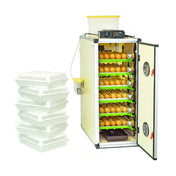Table of Contents
- What Is a Broody Hen?
- Signs Your Hen Is Broody
- How to Confirm If Your Hen Is Truly Broody
- What to Do With a Broody Hen?
- Preventing Future Broody Behavior
- FAQs About Broody Hens
This article is all about broody hens, but what does a broody chick mean, and how do you know if a chicken is broody? Broody, or broodiness, is when a hen displays behavior that shows she wants to sit on eggs, hatch them into chicks, and then raise them. I personally love it when I have a broody hen. It allows me to add new pullets to my flock and cockerels for the freezer. A major plus of a broody hen is that she will do all the incubating and brooding for you. That means no brooder in my house for 4–5 weeks and no flock integration. I have had a few of my hens go broody since I started raising chickens a few years ago. Every single one of my broody hens has had a 100% hatch rate! Sometimes the chicks even hatched a day or two early. Read on to learn more about broody hens and broodiness.
What Is a Broody Hen?
A broody hen is defined as a chicken exhibiting a strong instinct to incubate eggs, to hatch them and subsequently raise the resulting chicks. This contrasts with a nesting hen, whose primary drive is to lay eggs. While hens become broody due to a drive to reproduce, the presence of this behavior varies significantly across breeds. Many modern, high-production breeds have had the tendency for broodiness selectively bred out. However, the instinct remains strong in numerous Bantam and ornamental breeds, with Silkies, Cochins, and American Gamefowl being particularly well-known for their ability to become broody.
Silkies are more driven to broodiness, so many chicken breeders keep Silkies solely to incubate and raise chicks of other breeds. Allowing eggs to accumulate in the nest boxes can cause hens to go broody, so if you do not want broody hens, be sure to collect your eggs daily. Although some hens are so persistent and stubborn that they will sit on golf balls or even just shavings and try to hatch them out. Nesting boxes should be used to stop egg accumulation and prevent hens from going broody. If your henhouse stays rather warm, your hens will be more likely to go broody. This can be remedied by adding more ventilation to the henhouse or coop.
Signs Your Hen Is Broody
Many new poultry owners often ask, "How to tell if a hen is broody?" It is understandable why this can be confusing, as the initial signs of a hen preparing to lay can easily be mistaken for true broodiness. For someone new to raising chickens, seeing a hen spend a significant amount of time in the nesting box, sometimes up to an hour before laying, might lead them to believe she has gone broody. Similarly, a laying hen's tendency to growl or even peck if disturbed while laying, or her habit of arranging bedding, are normal nesting behaviors and not necessarily indicators of broodiness.
The key difference lies in the intensity and consistency of the behavior. While a laying hen visits the nest to deposit her egg, a truly broody hen will exhibit several distinct signs. She will refuse to leave the nesting box for extended periods, often staying there the entire day. You will likely notice her fluffing up her feathers and making defensive noises, such as growling or clucking aggressively, if you or other hens approach. A clear sign is that she will stop laying eggs altogether. You might also observe her plucking feathers from her chest to create a warm, feather-lined nest for potential chicks. Broody hens often become more territorial around their chosen nest. Furthermore, while they will instinctively warm the eggs, they may not eat or drink as frequently. When removed from the nest, a broody hen will promptly return to it. You might also hear her make a distinctive low-toned clucking sound and see her walking around puffed up with her wings slightly outstretched, ready to defend her space. Recognizing these consistent and intensified behaviors will help you accurately identify a broody hen.
How to Confirm If Your Hen Is Truly Broody
Sometimes, despite observing some of the initial signs, you might still be unsure if your hen has truly gone broody or is just exhibiting strong nesting instincts. Here are two simple ways to help you confidently confirm if your hen is truly broody:
-
The "Removal Test": If you gently remove a truly broody hen from the nesting box, she will almost immediately try to return to it. This strong urge to get back on the nest is a key indicator.
- Handling Behavior: When handled, a broody hen may exhibit defensive behaviors like growling, fluffing up her feathers, or even attempting to peck. This territorial and protective response towards the nest area further confirms broodiness.
What to Do With a Broody Hen?
Once you have confirmed your hen is broody, a key decision appears: Should you let her hatch eggs or break her broodiness? There is no simple right answer, as it depends on your goals and available resources.
If you aim to naturally raise chicks, supporting your broody hen through this process is key. You will need to move her to a more secure and quiet location, separate from the main flock, where other hens will not lay eggs in her nest and potentially disrupt the incubation of her eggs. A spare coop works well, but even a large dog crate within the henhouse or run can suffice. For those looking for more control over the hatching process, using an egg incubator offers precise temperature and humidity regulation, ensuring optimal hatch rates for various poultry eggs.
On the other hand, if you do not want your hen to hatch chicks, perhaps you do not have a rooster, or you need her to keep just egg laying, you will need to safely break her broodiness. The sooner you work on it, the quicker she will return to laying. A humane method involves disrupting her nesting instinct by placing her in a suspended cage with a wire bottom or poultry slat flooring, such as a HatchingTime grow-out chicken pen. This allows airflow around her and prevents her from comfortably settling down to incubate. Crucially, never attempt to break broodiness by dunking a hen in ice water, as this can cause severe shock and even death.
Preventing Future Broody Behavior
While a broody hen can be a wonderful mother, consistently dealing with broodiness might not align with your poultry goals. Fortunately, several proactive strategies can help minimize the occurrence of this behavior in your flock.
Optimizing Your Egg Collection Routine: One of the simplest and most effective methods for discouraging broodiness is to implement best practices for egg collection. Aim to collect eggs multiple times a day, rather than just once. This frequent removal keeps a hen from accumulating a clutch of eggs large enough to trigger her brooding instinct. Making your collection rounds in the late afternoon or early evening can be particularly helpful, as hens often lay throughout the day.
The Role of Dummy Eggs: The strategy of using fake eggs to discourage broodiness is a bit nuanced. While some believe leaving a few dummy eggs in the nest can satisfy a hen's urge to lay and thus reduce broodiness, the opposite can sometimes occur. A hen might interpret the presence of eggs as a reason to start incubating. Therefore, the effectiveness of this method can vary between individual hens and breeds. For consistent broodiness prevention, focusing on frequent real egg collection is generally more reliable.
Understanding and Managing Hen Flock Dynamics: The structure and social dynamics within your flock can also play a role in broodiness. Stress or changes in the flock can sometimes trigger unexpected behaviors, including broodiness in hens that do not typically exhibit it. Ensuring a stable and comfortable environment with adequate floor space, proper nutritional meals, and minimal stress can contribute to a more balanced flock. Observing your hens and understanding their personalities can help you identify and address any underlying factors that might be contributing to increased broodiness within your flock.
FAQs About Broody Hens
Here are some frequently asked questions regarding broody hens:
How long does broodiness last?
Broodiness can vary in duration depending on the hen and the breed. Typically, it can last anywhere from a few days to several weeks. If a hen is allowed to hatch chicks, the broodiness will usually continue for several weeks as she cares for her young. If the broodiness is broken, it might subside within a few days to a week.
Can a broody hen starve herself?
While a broody hen's instinct to sit on her nest is very strong, she will eventually leave to eat and drink. However, she may do so less frequently than usual. It is important to ensure she has easy access to food and fresh water to prevent her from becoming overly depleted.
What is the best way to care for a broody hen?
If you are allowing your hen to hatch eggs, provide her with a quiet, safe, and separate nesting area. Ensure she has access to food and water nearby. Avoid disturbing her unnecessarily, but do check on her periodically to make sure she is in good condition.
Will a broody hen lay eggs?
No, a hen in a state of true broodiness will cease laying eggs. Her focus is entirely on incubating the eggs she is currently sitting on.
What if I don't want chicks from a broody hen?
If you do not want chicks, you can either try to break her broodiness using safe methods or allow her to sit for the typical duration without fertile eggs. Providing her with unfertilized eggs or even golf balls can sometimes satisfy her instinct without resulting in chicks.
Can all hens go broody?
While the instinct to go broody is natural, it has been largely bred out of many modern commercial egg-laying breeds. However, many heritage breeds, bantams, and ornamental breeds still retain this tendency. So, not all hens will necessarily go broody.
Hatching Time Sanitary Poultry Equipment
About the Author

Aryeh Wiesel








